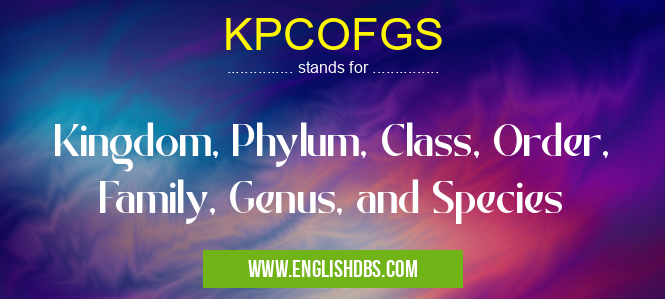What does KPCOFGS mean in LABORATORY
KPCOFGS is an acronym used to denote seven categories of scientific classification — Kingdom, Phylum, Class, Order, Family, Genus, and Species. These taxonomic categories are used by biologists in the study of organisms for identifying, classifying and organizing living things into distinct groupings. The levels of the KPCOFGS are organized from the largest and most inclusive category (kingdom) to the smallest and most specific level (species). Knowing the KPCOFGS allows scientists to search for organisms that possess certain characteristics and determine how closely related two species may be. In medical sciences, understanding KPCOFGS helps medical professionals understand different aspects of diagnoses and treatments as well as provide insights into disease etiology and pathogenesis.

KPCOFGS meaning in Laboratory in Medical
KPCOFGS mostly used in an acronym Laboratory in Category Medical that means Kingdom, Phylum, Class, Order, Family, Genus, and Species
Shorthand: KPCOFGS,
Full Form: Kingdom, Phylum, Class, Order, Family, Genus, and Species
For more information of "Kingdom, Phylum, Class, Order, Family, Genus, and Species", see the section below.
» Medical » Laboratory
Explanation
The first level of KPCOFGS is the kingdom. It refers to a broad general grouping based on major differences between organisms such as plants or animals. The next level is phylum which further divides kingdoms into smaller groups called phyla based on progressively more detailed shared characteristics such as body shape or reproductive methods. Following this are class which further divide phyla into classes; order which assign species within a class a specific rank; family which categorize genera according to shared physical traits; genus which distinctively classify groups of closely related species; and finally species which refine distinctions among individuals within a genus based on morphology or DNA data. By utilizing all seven levels of KPCOFGS, scientists can make precise distinctions between different organisms even if they appear very similar at first glance.
Essential Questions and Answers on Kingdom, Phylum, Class, Order, Family, Genus, and Species in "MEDICAL»LABORATORY"
What is KPCOFGS?
KPCOFGS stands for Kingdom, Phylum, Class, Order, Family, Genus, and Species. This system is used to classify living organisms into distinct groups based on their shared characteristics. These broad-scale categories are then broken down further into finer levels of detail to create a hierarchy of taxonomic categories.
How many levels are in the KPCOFGS classification system?
There are seven levels in the KPCOFGS classification system; Kingdom, Phylum, Class, Order, Family, Genus and Species. The higher the level in the hierarchy the broader the category and fewer members it has. The lower the level in the hierarchy the narrower it becomes with only a few species within that group.
What is an example of an organism classified under KPCOFGS?
An example of an organism classified under the KPCOFGS system would be a brown bear (Ursus arctos). It belongs to the kingdom Animalia (animals), phylum Chordata (vertebrates), class Mammalia (mammals), order Carnivora (carnivores), family Ursidae (bears) genus Ursus and species arctos.
How is scientific nomenclature related to KPCOFGS?
Scientific nomenclature is related to KPCOFGS as it uses this hierarchical structure for classifying and naming organisms according to their shared characteristics. When scientists give organisms scientific names they usually follow binomial nomenclature – two terms usually Latinized words – connected by ‘X’ which represent its genus and species respectively within its taxonomic hierarchy following KPCOFGS
How have taxonomical orders changed over time?
Taxonomical orders have changed over time as more information about new species becomes available or when outdated views on certain groups are replaced with new ones based on current scientific research findings. These changes can include adding or deleting an entire order or making modifications at various marginal levels.
Are all living creatures classified under KPCOFGSA?
Yes, all known living creatures including plants, animals and microorganisms are classified under KPCOFGSA according to their shared characteristics which allows us to recognize them more easily amongst other similar creatures on Earth.
Why should I care about learning about different taxonomic groups?
Learning about different taxonomic groups helps us understand our natural world better by understanding how life forms interact with each other through evolution and adaptation over time as well as providing us with insight into why certain creatures look or behave differently from others in their same group.
What is a genus?
A genus is a rank within the hierarchical structure of taxonomy that exists between family and species. It houses one or more closely related species that share common characteristics but can still be distinguished from one another.
What does “binomial nomenclature” mean?
Binomial nomenclature refers to naming systems used in science where each organism assigned has two parts - its genus and specific epithet - that together make up its scientific name such as Ursus arctos for brown bears.
Final Words:
KPCOFGS is an invaluable tool for biologists in navigating through the complexities of living creatures’ taxonomy hierarchy. It provides a comprehensive framework for finely distinguishing any organism down to its species. Understanding this system also supports robust research outcomes in medical sciences such as diagnostics, treatments and etiology investigations due its ability to compare similarities between diseases or symptoms across different species. Therefore, KPCOFGS is one key component that enables scientists and health care providers in obtaining greater insight into our biological world.
